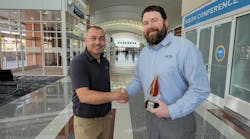Concession analysis seminar explores trends
Pay toilets to deregulation: Where airports have been and where they're headed
By Jordanna Smida, Assistant Editor
February 2000
PHILADELPHIA — "The past teaches us generalizations that are usable so we can understand the present and predict the future," states Michael O'Hara, operations vice president of real estate and general counsel for Brookstone, a nationwide specialty consumer product retailer.
Such was the theme that presented itself throughout the 10th annual Embry-Riddle Aeronautical University Concession Analysis Seminar. Focusing on the future, sessions throughout the seminar addressed past and present issues to determine where airports should be heading with their concessions programs.
Airport representatives, consultants, and concessionaires were welcomed by the city's mayor, Edward Rendell. In his opening remarks, he shared his enthusiasm over the new trends in airport concessions, in particular pricing, as he recalled spending $11 for a coke and M & Ms a few years ago.
Frank Newton Jr., vice president of Newton & Associates, put things in perspective for attendees as he recalled his first job at an airport — collecting the money from pay toilets and vending machines — a major source of revenue for airports during the ’60s and ’70s. "Since deregulation this industry has seen the merchandising of airports and of America. Service is important to passengers and airports must try to present their best front door," Newton says.
One of the highlights of the conference was keynote speaker Barbara Caplan, senior vice president and partner of Yankelovich Partners, Inc., and guru of consumer behavioral science for corporate America. She discussed the current trends of American consumers and how airports can benefit, noting that the typical customer is now smarter and demands first-class service and customization. A large factor in this shift in attitude can be attributed to the Internet, Caplan says, which brings a sense of control to the consumer.
She also notes that the hassle factor for consumers is greater because they have more things to be stressed about. "The consumer no longer wants the same as the masses, but instead is looking for services tailored to their needs," she states. "Sixty percent of consumers are looking for a quieter, simpler life." Her advice to airports: Look at what you're doing to relieve stress and what you're doing to cause it.




